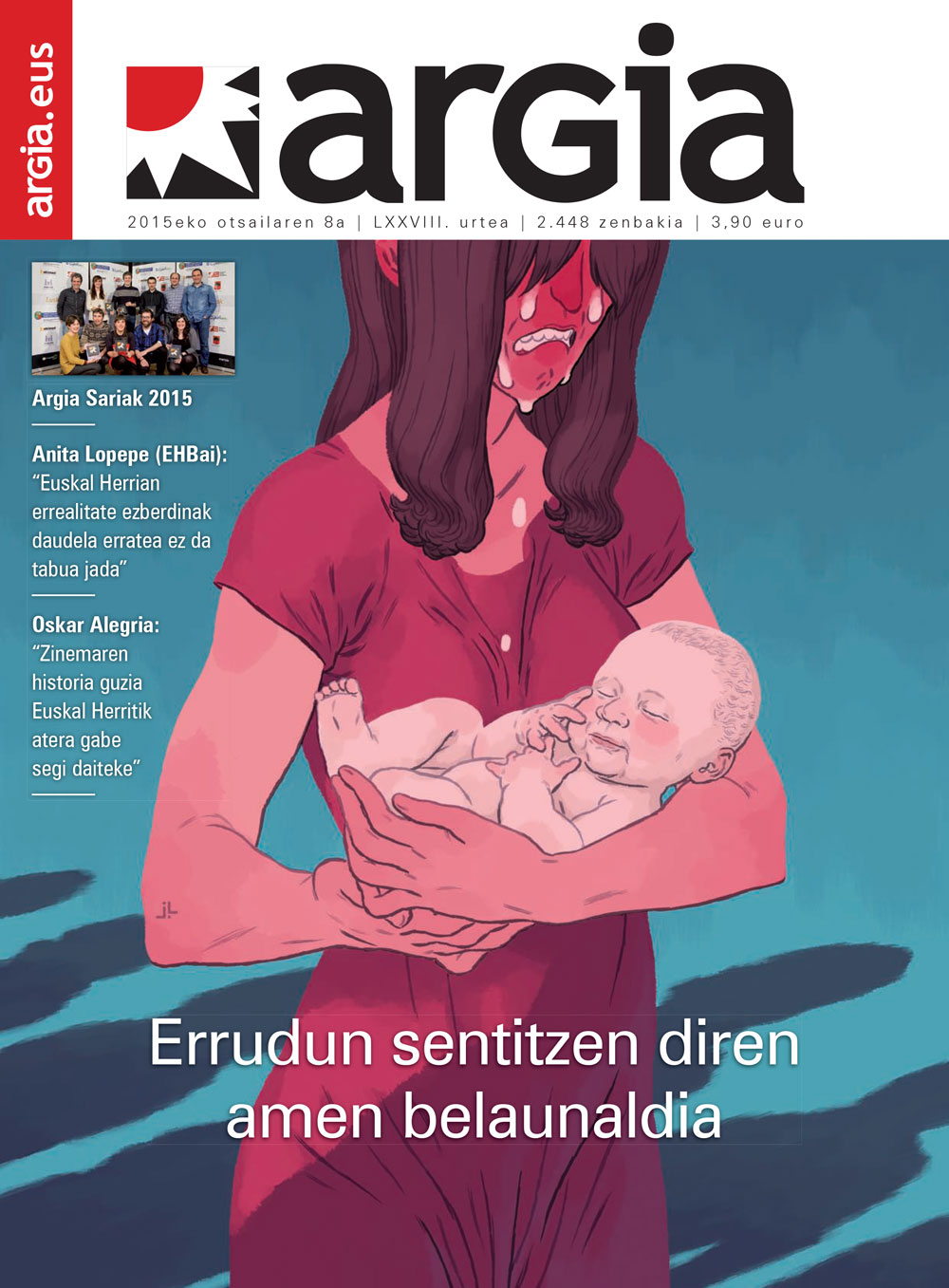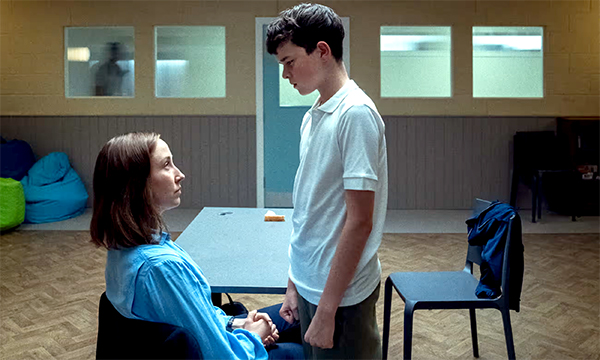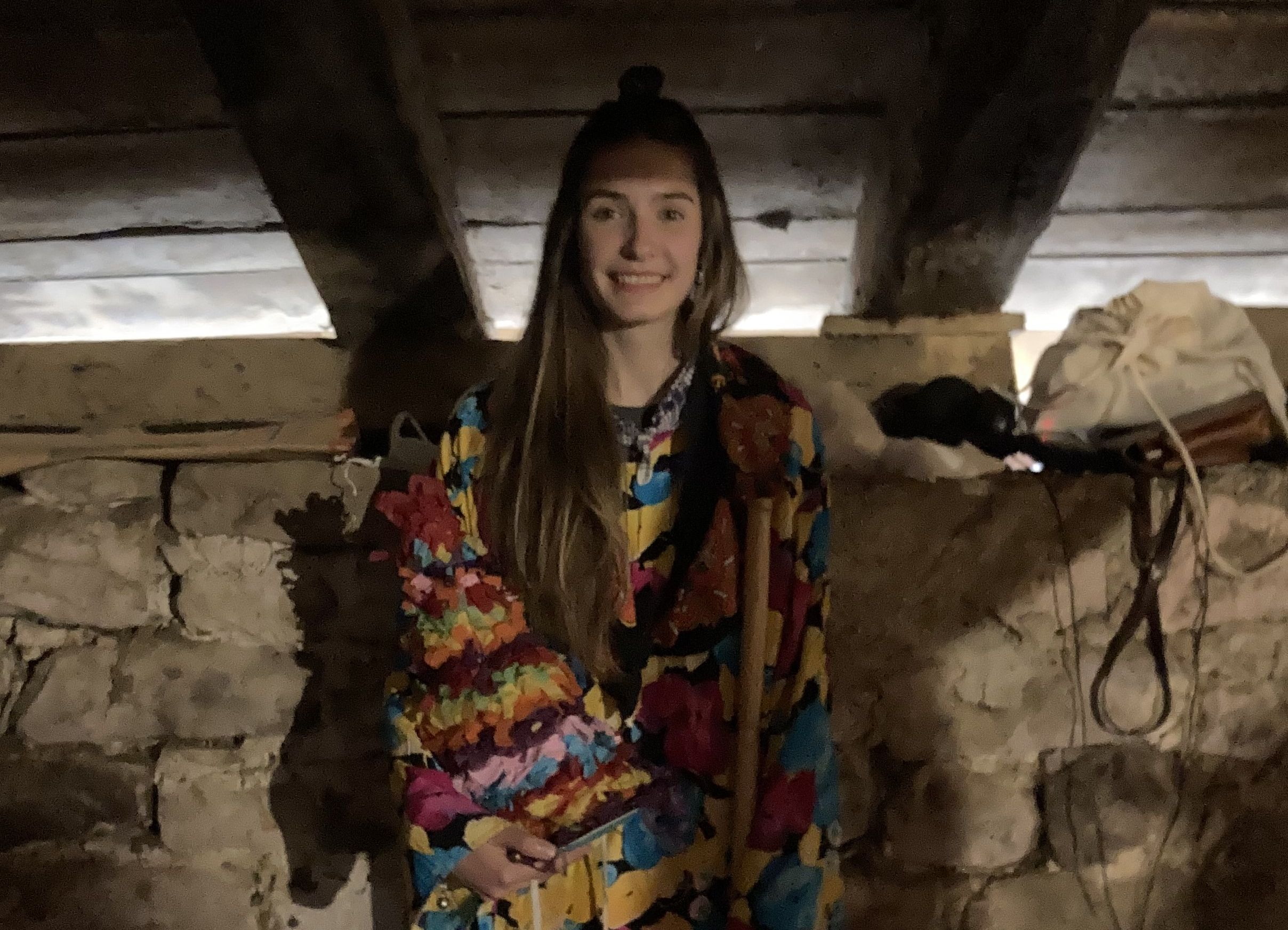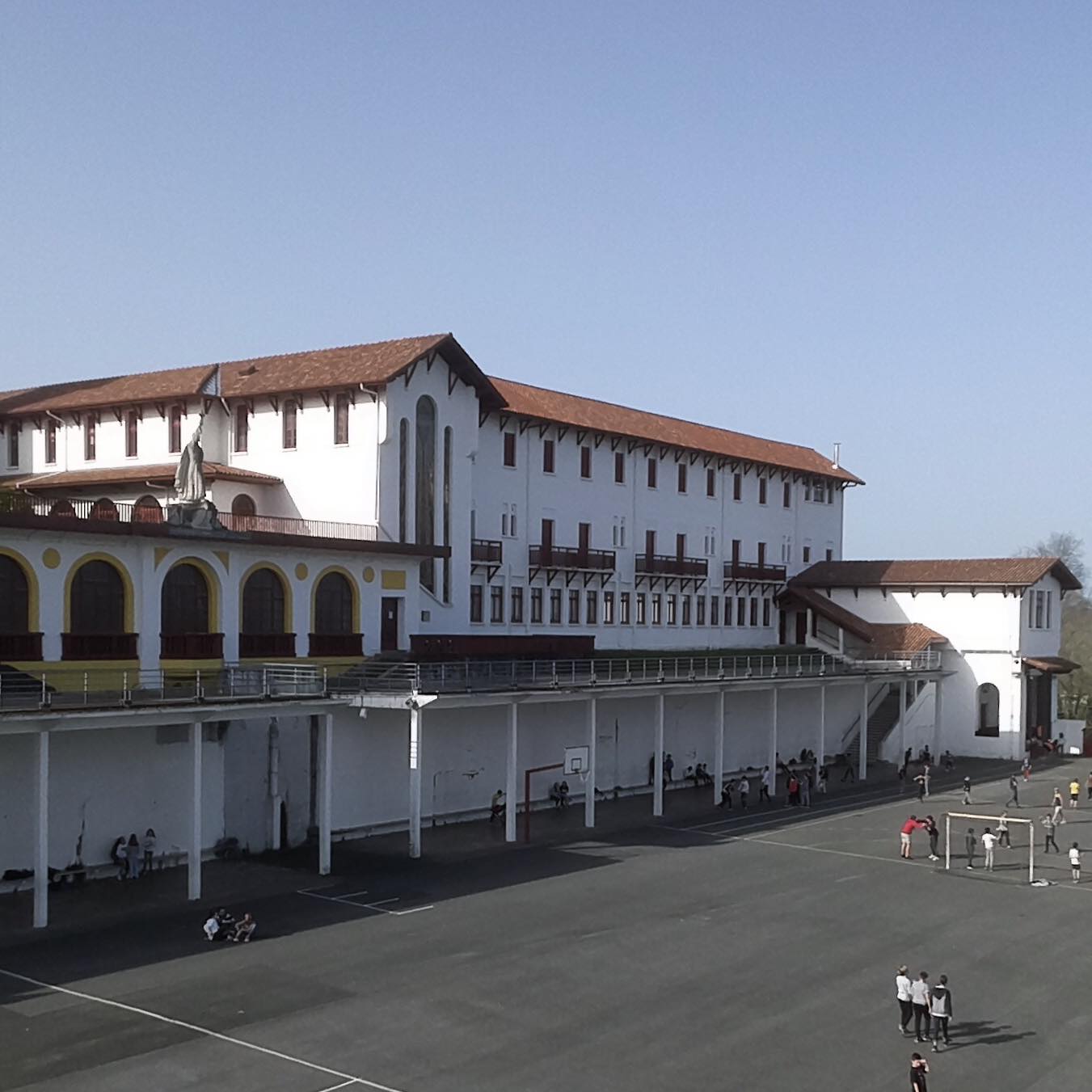Mothers drowned by criticism from each other
- Because he leaves the job and stays at home, because he takes the child to kindergarten and keeps earning a salary. Because she has decided to breastfeed for up to two years; because she gives her milk purchased from the pharmacy in the bottle. Because he sleeps in bed with the newborn, because the child spends the night only in the cradle of the adjoining room. It's the generation of mothers who feel guilty.
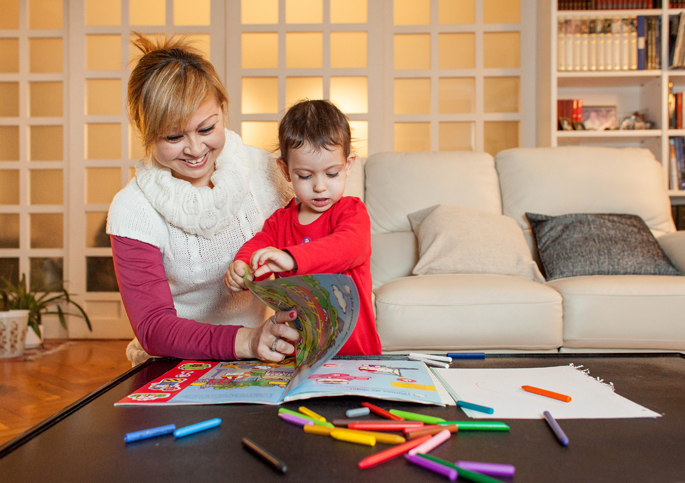
Irati Fernández Pujanak Feminism and maternity: An uncomfortable relationship? carried out an investigation. We ask him if there is a war on the sides: “Speaking on the side seems to me to speak categorically. There is a hegemonic ideology (traditional motherhood) that tells us motherhood in one way or another, and in front of it there are alternative experiences, especially those that drive the feminist movement. I don’t think someone says ‘I mean the ideal of the good mother’ and someone else will think ‘I won’t give priority to raising the child’. I wouldn’t talk about extreme ideologies.” We have tried to follow a model of motherhood, we have said that society is ugly to all mothers, and yes, categorically, that is what can be said, that mothers are always judged.
Feminists also pursue naturalizing ideology
The anthropologist Mari Luz Esteban and Irati Fernández are concerned about the evolution of the disease. The ideal of the good mother is gaining strength; naturalizing or essentialist motherhood has opened the door to it. The ideal of the good mother has been built in the last two centuries, and the model that is being consolidated in the Basque Country during these twenty years is based on it. Several feminist mothers have also internalized it. In the opinion of Mari Luz Esteban, this conservative ideology is very naturalizing and considers social inequalities as natural, such as the distribution of care tasks. By following this code, instead of bringing women and men closer together, it will make them more and more different. Irati Fernández spoke with the mother of several feminists to investigate and knows that “progressive feminists have also fallen into the grip of children’s natural growth.” In her opinion, we must go beyond discussing whether natural growth is good or bad, whether these practices are oppressive or not for the mother.
Good mother
The good mother who sells us the hegemonic ideology is willing to give everything and will not ask or expect anything to come to her. The mother is a mother and will always be there until muera.Este code has a number of social demands, among which the absolute priority of parenting stands out and the fact that being a woman makes you know more about motherhood than men. Specifically, and focusing on the naturalizing model that has gained strength nowadays, the good mother must have natural pregnancies and births, the mother's skin is very important and breastfeeding is preferred, among other things.
Discourse is one thing and practice is another.
Feminism has been very critical of motherhood. Adrienne Rich, poet and essayist, believes that a distinction must be made between institutional motherhood and practices. To the extent that the traditional model of motherhood becomes an institution, and as a patriarchal, it must be criticized and dismantled. On the other hand, we have very varied maternal experiences. It's not the same thing to talk about mothers in Western Europe as in Africa. It's not the same for one social class as it is for another. Something similar says Esteban in Hik Hasi magazine: “We have to bear in mind that motherhood is a very varied experience, and we tend to homogenize it. We have to look at the speeches, the ideologies, but depending on social class, age, feminist or non-feminist ideology, training... there will be different practices”.
Ideologies are not the same as practices, but ideologies influence mothers' daily lives, influence the decision to follow one model or another, and society strongly criticizes mothers based on these weightings. And all mothers are judged by society, because they cling to affective parenting and sleep with the child, who breastfeeding the child at any time and anywhere. And to the mother who's been looking for alternative paths by facing the hegemonic code, because on Fridays she's going to have dinner with her friends, leaving the child in her father's arms and taking her to the nursery for four months. The judgments make “guilty”. Today, we have a group of mothers who feel guilty.
Irati Fernández tells us the reflection of Adrienne Rich that we have just explained and Fernández makes the following reflection: “Feminist theory has traditionally criticized motherhood as an oppressor for women, but perhaps there has been a kind of vacuum to reflect on how to construct motherhood differently. The feminists who have participated in the study have put on the table the lack of reflection on this topic. It is clear that the traditional approach must be criticised, but are we talking about alternatives?”
Tight mothers
Parents do not feel guilty, says Esteban: “A mother is still being demanded of what a parent is not asked for. We have tremendous demands on mothers. Guilt is widespread in women, but in men it is not. In society, there's a lot of pressure on mothers. It's not just the media pressure, or the medical-scientific discourse... The pressure from those around us is high. Any mother gives advice.”
Feminist mothers also feel guilty. Internal tensions are created between feminist identity and motherhood. These conflicts are evident in Fernández’s research with feminists. The report analyses heterosexual couples and observes how the egalitarian pact they have built between men and women is shaken, even breaking the pact. Because it is not the same to live in equality when there are no children, when motherhood and paternity come into play. The gender system is reinforced through motherhood and imbalances occur in care tasks, domestic tasks, the way to occupy or not time and space. In the first year of life, the mothers who participated in the research recognized that they did not realize that the pact with their partner was about to explode. After two years in which the child achieves a sufficient capacity to cope on its own it is no coincidence, women begin to use strategies to alleviate the imbalances between father and mother. “Children start to think after a year, where is that man, who told me that he would take care of this and that?” They admit they've jumped into the trap. They want to be a militant feminist forever, they believe that their principles will be maintained, and then they don’t.” In the opinion of Fernández, feminism contributes to the awareness of the inequalities of the gender system and, once given the situation, strategies must be put in place to face it.
Irati Fernández and Mari Luz Esteban are clear that the hegemonic ideology of the good mother, through the naturalization of motherhood, is pressuring the mothers of today. For his part, Nahia Alkorta, who has decided to practice attachment rearing (see table below), tells the burden of the mothers who have made that decision. In his view, two sides have been set up around motherhood which are fighting each other. The two sides lose.
Bi urte eta erdiko semea du Nahia Alkortak. Donostiatik Tolosaldeko Irurara joan ziren bizitzera bikotekidea eta biak, haurra hazteko herri txikia hobe dela uste dutelako. Hirurak bizi ahal izateko bikotekidearen lanpostua mantentzea beharrezkoa izango zela erabaki zuten. Horixe dago eguneroko antolaketaren erdigunean eta horren arabera moldatzen da familia. Hiru errelebotan egiten du lan bikotekideak, eta Alkorta berriz, batik bat etxetik aritzen da lanean. Ez du ohiko –gero eta ohiz kanpokoagoa– zortzi orduko lana. Antzerki eskolak ematen dizkie haurrei eta Sabeletik Mundura proiektuan dabil buru-belarri. Eskolek bezala, egitasmoak ere, etxetik kanpo lan egitea eskatzen dio tarteka, hitzaldiak emateko esate baterako. Haurra ez dute haurtzaindegira eraman, eta 2 urtetik aurrera eskolara joateko aukera badu ere, etxean dute txikia.
Umearen erritmoak errespetatuz
Atxikimenduzko haziera du gustuko Alkortak –gaiari buruz Umea, kume bloga du argia.eus-en– eta eredu horren arabera hazten saiatzen dira haurra. Oinarri-oinarrian dago haurraren erritmoak errespetatzea; erritmo fisiko eta emozionalak. Poliki-poliki helduen mundura ohitu behar du eta horretan lagundu behar zaio umeari, etengabeko borrokak saihestuz eta alboan egonez. Oinarri horren zati oso garrantzitsua da umearen erreferentziazko pertsona. Pertsona horrekiko harreman sendoa egingo du eta hark lehenengo 2-3 urtetan erakutsitakoa berebizikoa izango da etorkizunean.
Ahal bada 6 urtera arte etxean
“Umeak bizi guztian ez ditu izango 3-4-5 hilabete. Garapen osoan lehenengo hiru urteak garrantzitsuenak direla frogatuta dago. Hiru urte horiek eskain badiezazkiokezu, zergatik ez egin? Gurea ez da EuroDisneyra joango, baina nahiago dut 9 hilabete berarekin pasatzea, astebetez EuroDisneyra joan eta gero urte osoan denborarik ez edukitzea baino”. Haurtzaindegia, haur eskola, umeen beharrak asetzeko baino helduen beharrei erantzuteko direla uste du Alkortak. Ahalegina egingo dute umea 6 urtera arte eskolara ez eramateko, baina ez dakite lortuko duten: “Gu ere bizi gara, biok ari gara lanean, Tetrisa egiten dugu ordutegiekin, guraso guztiek bezala. Agian beste mota bateko eskolaren batera eramango dugu astean bitan, eta hori ere gurasook denbora behar dugulako egingo genuke, ez umeak behar duelako. Baina gerta daiteke haurrak berak eskatzea ere”.
Haurrak haurrekin zortzi orduz?
Haurra bizitzaren parte dela aldarrikatzen du Alkortak eta egunerokoan nekez txertatzen ditugula umeak. Eskolan, parkean, eskolatik kanpoko ekintzetan, adin berekoak daude elkarrekin. “Haurrentzako eremu itxiak dira, laborategiak, ez dute jendartean parte hartzen. Gu ez gara egoten gure adineko 20 pertsonekin zortzi orduz, eta gero handik atera. Bizitzan integratu beharrean, bizitzarako prestatzeko laborategian sartzen ditugu”. Alkortaren haurra amarekin eta aitarekin egoten da batik bat, “eta erosketak egitera daramat, edo lagunekin nagoenean nire lagunekin dago, eta batzuetan parkean eta dantza tailerrean dago bere adinekoekin batera”.
“Inoiz baino biziago nago”
Behin baino gehiagotan esan diote “ez daukazu bizitzarik” esaldia. Haurra jaiotzen denean bizitza aldatzen dela ez dauka zalantzarik, edonork argi izan beharko lukeela uste du. “Oso zoriontsua naiz, lanean ari naiz, ume bat hazten ari naiz eta proiektu potente bat dut esku artean. Ez daukat bizitzarik? Ni inoiz baino biziago sentitzen naiz”. Ama bigarren planoan ez ote den geratzen galdetu diogu: “Bizitza berrira egokitu egiten zara. Egunean zortzi ordu haurrarekin pasa badituzu, ordu horiek ez dituzu bizi? Lanean pasatako zortzi orduak ez dira zure bizitzaren parte?”.
Kalean bularra ematen ikusi eta “denetarik” esan diote: “Haurra ordutegiaren menpe elikatu behar da? Biologikoki ez dago prestatuta. Bularra ematea plazera da, biona da momentua. Ez baduzu horrela bizi, ez daukazu zertan bularra eman, ez da ezinbestekoa”. Alkortaren ustez, gurasotasuna grisa da, ez zuri ez beltz, eta grisak azpimarratzen ez badira amatasun eredu desberdinak aldarrikatzen dituzten bandoen arteko gerra hasten da, “eta bi bandoek galtzen dute”.
Mari Luz Esteban antropologoaren ustez, asko hitz egiten da amatasunaz eta beti amaz aritzeak arriskua du. Erdigunean umeen zaintza jarri behar dela dio, eta horri buruz hausnartu eta eztabaidatu. Zaintzaren ardura (maila desberdinetan) amak, aitak, gizarteak, erakunde publikoek dute. Gaur egun ere, haurraren zaintza amaren ardura izatea da ohikoena eta behin eta berriz amatasunaz jarduteak ez du laguntzen zurrunbilo horretatik ateratzen.
Ekonomia feministak gizakiaren bizitza erdigunean kokatu beharko litzatekeela dio. Bizitza babesteak, besteak beste, zaintza lanak ikusgarri egitea eta baloratzea esan nahi du. Hausnarketa hori ez al dago kontraesanean feminismoak kritikatzen duen ideologia hegemonikoarekin, hau da, amatasun tradizionalaren ereduarekin?
Irati Fernández Pujana: Ekonomia feministak dio, parametro patriarkal eta kapitalistak bertan behera utzi ahal izateko, bizitza erdigunean jarriz gero mekanismo instituzional, sozial eta pertsonal guztiak zaintzaren inguruan mugituko direla. Baina jakina, abiapuntutzat sexu bereizketa baldin baduzu, hau da, amari lan hauek dagozkio eta aitari beste hauek, ekonomia feministaren mezutik ondorioztatuko duzuna da zaintzari aurre egin behar diona emakumea dela, ama. Abiapuntuak ez luke horrela behar. Sexu bereizketa alboratzen baduzu, zaintzari eta etxeko lanei, jendarte parekide hipotetiko batean, denok erantzun beharko genieke.
Feministekin egin nuen ikerketan bikote heterosexual batek honela jokatu zuen bi semeen zaintzaren aurrean: umeen zaintza lehentasuna izango zen eta horren arabera amaren eta aitaren agenda, denbora, espazioak, harremanak, militantzia, lana, moldatuko zituzten.
Umeak jarri zituzten erdigunean. Emakumeak kontzientzia feminista handia zuen, eta haren ustez umearekiko eta bikotekidearekiko harremana ez zen ari gauzatzen modu naturalizatzailean.
Aspaldi pertsona oso zatar bat ezagutu nuen, urrun izatea komeni den pertsona horietako bat. Bere genero bereko pertsonengana zuzentzeko, gizonezkoengana, “bro” hitza erabili ohi zuen. Edozein zapaltzeko prest zegoen, bere helburuak lortzeko. Garai hartatik hitz... [+]
La bajona kolektibo kide Heiko Elbirak salatu du psikiatriak zisheteroarautik aldentzen diren erotikak kontrolatu nahi dituela.
Prentsaurrekoa eskaini dute ostegun honetan Marc Aillet Baionako apezpikuak, elizbarrutiko hezkuntza katolikoko zuzendari Vincent Destaisek eta Betharramgo biktimen entzuteko egiturako partaideetarikoa den Laurent Bacho apaizak. Hitza hartzera zihoazela, momentua moztu die... [+]
Antifaxismoari buruz idatzi nahiko nuke, hori baita aurten mugimendu feministaren gaia. Alabaina, eskratxea egin diote Martxoaren 8ko bezperan euskal kazetari antifaxista eta profeminista bati.
Gizonak bere lehenengo liburua aurkeztu du Madrilen bi kazetari ospetsuk... [+]
11 adin txikikori sexu erasoak egiteagatik 85 urteko kartzela zigorra galdegin du Gipuzkoako fiskaltzak. Astelehenean hasi da epaiketa eta gutxienez martxoaren 21era arte luzatuko da.
MAITE: (biharko eguna antolatzen bere buruaren baitan) Jaiki, gosaldu, bazkaria prestatu, arropa garbitu, etxea garbitu, gizon hori jaiki, seme-alabak jaiki, hiru horien gosaria prestatu, haiek agurtu, erosketak egin, lanera joan, seme-alabak eskolatik jaso, merienda eman,... [+]
Matxismoa normalizatzen ari da, eskuin muturreko alderdien nahiz sare sozialetako pertsonaien eskutik, ideia matxistak zabaltzen eta egonkortzen ari baitira gizarte osoan. Egoera larria da, eta are larriagoa izan daiteke, ideia zein jarrera matxistei eta erreakzionarioei ateak... [+]
Lantzeko inauteri txikien kalejira ikusle guztien begietara urtero modukoa izan zen. Txatxoak, Zaldiko, Ziripot eta Miel Otxin herriko ostatuko ganbaratik jaitsi eta herritik barna bira egin zuten txistularien laguntzarekin. Askok, ordea, ez zekiten une historiko bat bizitzen... [+]
Elizak 23 kasu ditu onarturik Nafarroa Garaian. Haiek "ekonomikoki, psikologikoki eta espiritualki laguntzeko" konpromisoa adierazi du Iruñeko artzapezpikuak.
15 urteko emakume bati egin dio eraso Izarra klubean jarduten zuen pilota entrenatzaile batek.
Lestelle-Betharramgo (Biarno) ikastetxe katolikoko indarkeria eta bortxaketa kasuen salaketek beste ikastetxe katoliko batzuen gainean jarri du fokua. Ipar Euskal Herriari dagokionez, Uztaritzeko San Frantses Xabier kolegioan pairaturiko indarkeria kasuak azaleratu dira... [+]
Uribe Kosta BHI institutuko hainbat ikaslek salatu duenez, mezu "iraingarriak, matxistak eta homofoboak" jaso dituzte Batxilergoko beste ikaskide batzuengandik. Horrez gain, gaineratu dute mezuak irakasle bati ere bidali dizkiotela eta beste ikasle batzuen... [+]
Bi neska komisarian, urduri, hiru urtetik gora luzatu den jazarpen egoera salatzen. Izendatzen. Tipo berbera agertzen zaielako nonahi. Presentzia arraro berbera neskek parte hartzen duten ekitaldi kulturaletako atarietan, bietako baten amaren etxepean, bestea korrika egitera... [+]







